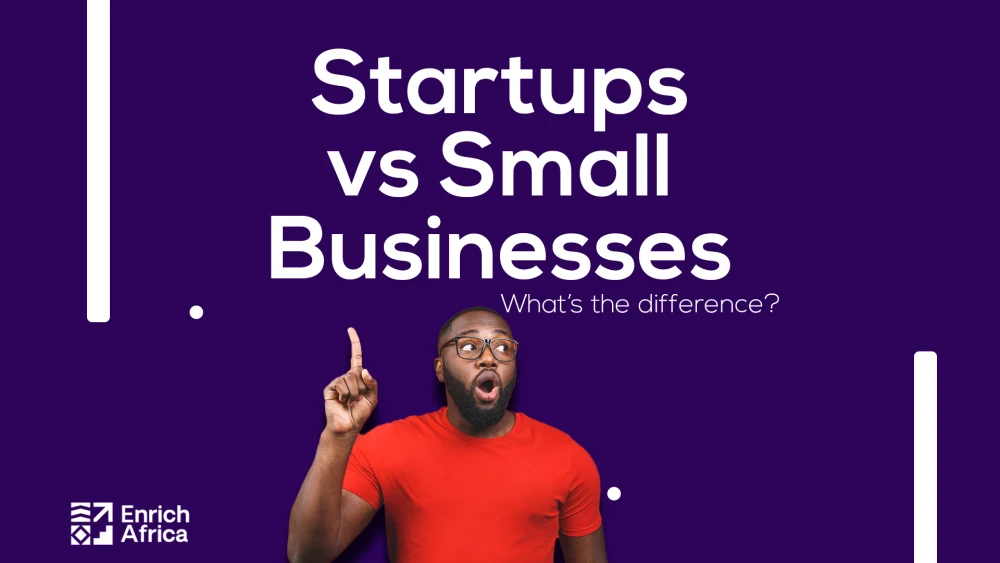
One error that most people often overlook is the use of ‘Startups’ and ‘Small Businesses’ interchangeably. The two are not the same. Even though they may share certain similarities in size, there is a fine distinction that sets one apart from the other.
For emphasis, Startups are essentially online and mostly technology-oriented businesses that target a larger market or economy. They grow to become large corporations and global companies.
Small businesses on the other hand don’t require a big market to grow into. They aren’t in search of a business model that works down the line at every stage of the business. Suffice to say that there is nothing more after they have fully launched—they’re mostly just looking for a business model that works from day one. These businesses are self-sustaining entities that generate just enough revenue from the first day of opening. No major investment is needed, no time to even formulate a company that works down the line.
Typically, small businesses bring in a relatively small amount of sales, target a relatively small demographic and strive to maintain their relevance in the immediate market it serves.
Startups VS Small Businesses
The following are the major differences that set these two apart
The Growth Intent
No doubt that every business aims at growth. But growth can be used in this case to
differentiate small businesses from startups.
Every startup founder aims to disrupt the market with an impactful business model - they simply want to take over the market. Founders are also aware that their ultimate goal won’t happen overnight. So, a lot comes to play to achieve that dream at every stage of the business.
Startups require initial investments which returns may not even yield immediate results. This makes startups not profitable enough in their early stages of business (and some startups never even reach profitability).
Small businesses on the other hand don’t require a big market to grow into. They only strive to reach and serve all of those within their immediate market in an efficient way - they’re not disrupting an industry, but are attempting to be profitable within it.
Funding Methods
Startups source funds from investors to scale their businesses while small businesses thrive on grants and loans. Investors get equity from the startup as they grow while small businesses that take loans provide collateral and pay interest to loan providers.
Also, startups embark on various funding stages; there are the pre-seed capital, seed capital, Series A, B, C funding stages while in small businesses there exist no such funding stages.
Funding can be challenging for both as giving money to a business can be a risky action. But startups face more challenges in funding when typically looking for major investments right off the bat. Startups need investors who are also looking to make major investments—but here’s the challenge, investors get so picky about who they put their confidence in.
For small business owners, sourcing for loans these days has become quite easy. In some cases, established startups can even finance small businesses with loans without any collateral. And in cases where collateral is needed, these businesses stand more chance to get the loans as long as they can provide collateral that will suffice.
Different ‘End Game’
Everyone wants to stay in business. But for the startup founder and the small business owner, the end games are different.
The small business owner is only looking to establish a long-lasting, self-sufficient business in the long run that can even be passed down to members of the family - they are not bothered about any exit plan.
Whereas the startup founder is burdened with the troubles of temporality - If everything goes as planned, the startup turns into a massive global company—experiencing an IPO (initial public offering) event (disruption achieved? Maybe!). Another common reality for most startups is a buy-out from a larger company.
READ ALSO - Apply for CBN’s N500M TIES Grants
Labour Intensiveness
You will find that Startups, regardless of the size, are not labour intensive as they usually leverage technology to grow their business, while small businesses require physical labour for the business to grow and are oftentimes dependent on products that may have been facilitated by the startup
This makes small businesses more labour intensive than startups.
The importance of this distinction
When you’re about to venture into any business idea, it is important to think through what kind of entrepreneur you really are: a startup entrepreneur or a small business entrepreneur.
Because
Making this distinction early will help define the path for your business: what your early expectations should be, how you plan on growing and executing, who you plan on partnering with, and how you’ll define success in the end.
Tags
Startups
Small Businesses
Loans
Investments
Categories
News
Similar News
Are you a start-up or an entrepreneur in Africa?
Subscribe to our mailing list



